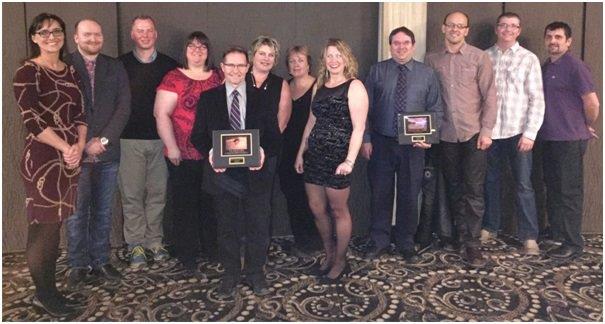Intensive Care Outreach Services Improve Patient Care
by Communications
 Members of the RCCR team accepting the Walk the Talk 2016 Board of Directors Award.
Members of the RCCR team accepting the Walk the Talk 2016 Board of Directors Award.Some in the hospital need close monitoring due to the seriousness of their injury or illness. Thunder Bay Regional Health Sciences Centre’s Medical Emergency Team (MET) and Regional Critical Care Response (RCCR) program are essential services that deliver high quality critical care to countless patients throughout Northwestern Ontario, improving the quality of care and patient outcomes.
MET is a group of specially trained health care providers who provide life saving interventions outside the doors of the Intensive Care Unit (ICU). MET works throughout the Hospital responding to the needs of seriously ill or injured patients to prevent further deterioration.
The MET team consists of an ICU nurse and a physician who are supported by an interdisciplinary team of health care professionals who work together to provide high quality patient care 24 hours a day, seven days a week. Early medical intervention by MET has resulted in a documented reduction of in-hospital cardiac arrests and improved patient safety.
The RCCR program is an innovative eHealth strategy that uses videoconferencing through the Ontario Telemedicine Network (OTN) for patient assessments who require transfer to Thunder Bay. All eleven community hospitals and four nursing stations in Northwestern Ontario have the ability to directly connect with critical care trained physicians, nurses, and respiratory therapists at our Hospital.
Through RCCR, regional patients benefit from immediate access to experts in critical care, reduced transport times, and delivery of care closer to home. There has also been a reduction in the number of transports, and reduced travel expenses for patients, families and the health care system.
“The intensive care services provided by MET and RCCR are very beneficial to patients and their families across the region,” said Edie Hart, Clinical Lead for the RCCR program. “As an example, we experienced an ice storm in April 2017 that hit the Northwest and halted all city activity within Thunder Bay for 48 hours. ORNGE was grounded, no flights were coming or going, and there were two critically ill patients in Fort Frances and Geraldton. The RCCR doctor, nurse, and respiratory therapist were able to virtually connect multiple times throughout the day, supporting the staff in the regional hospitals to provide the necessary life saving interventions until both patients were safely transferred to our Hospital.”